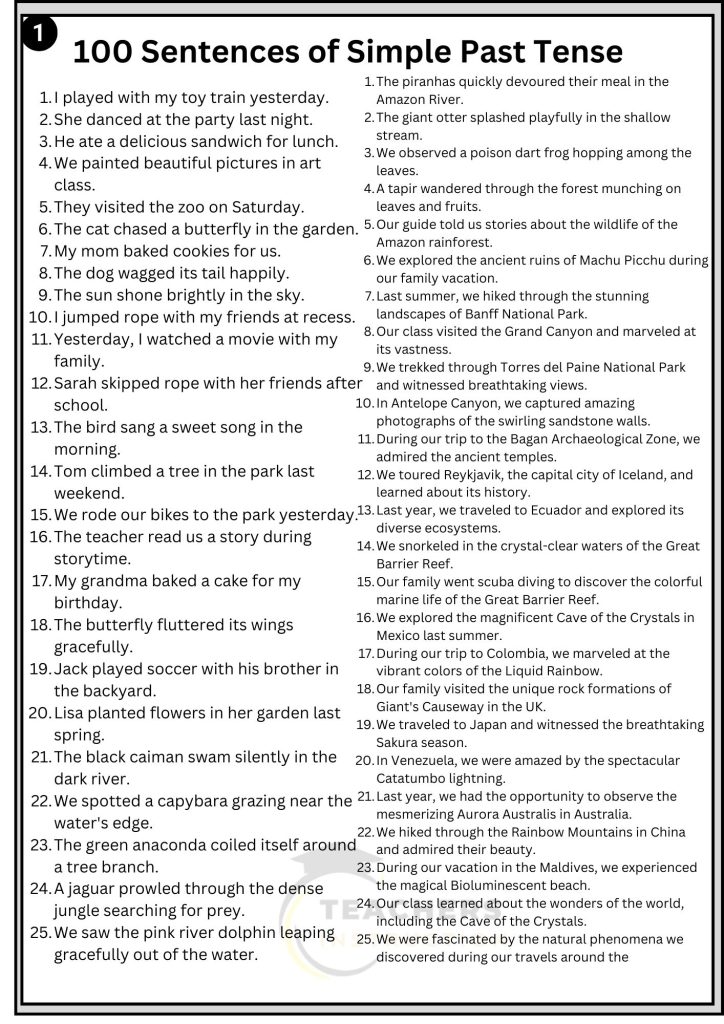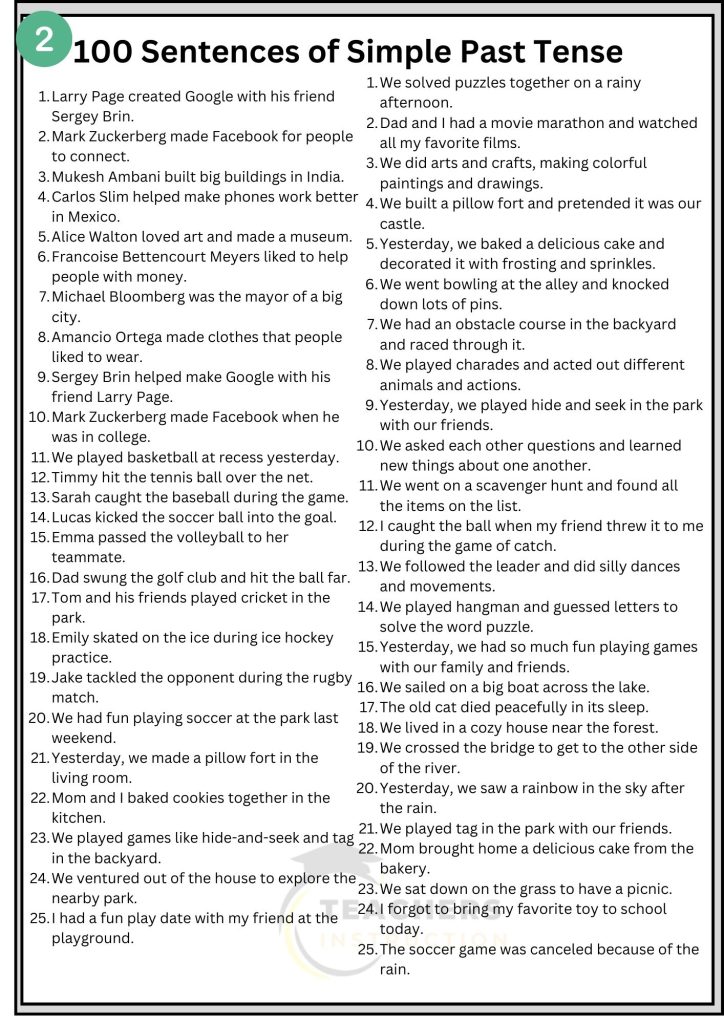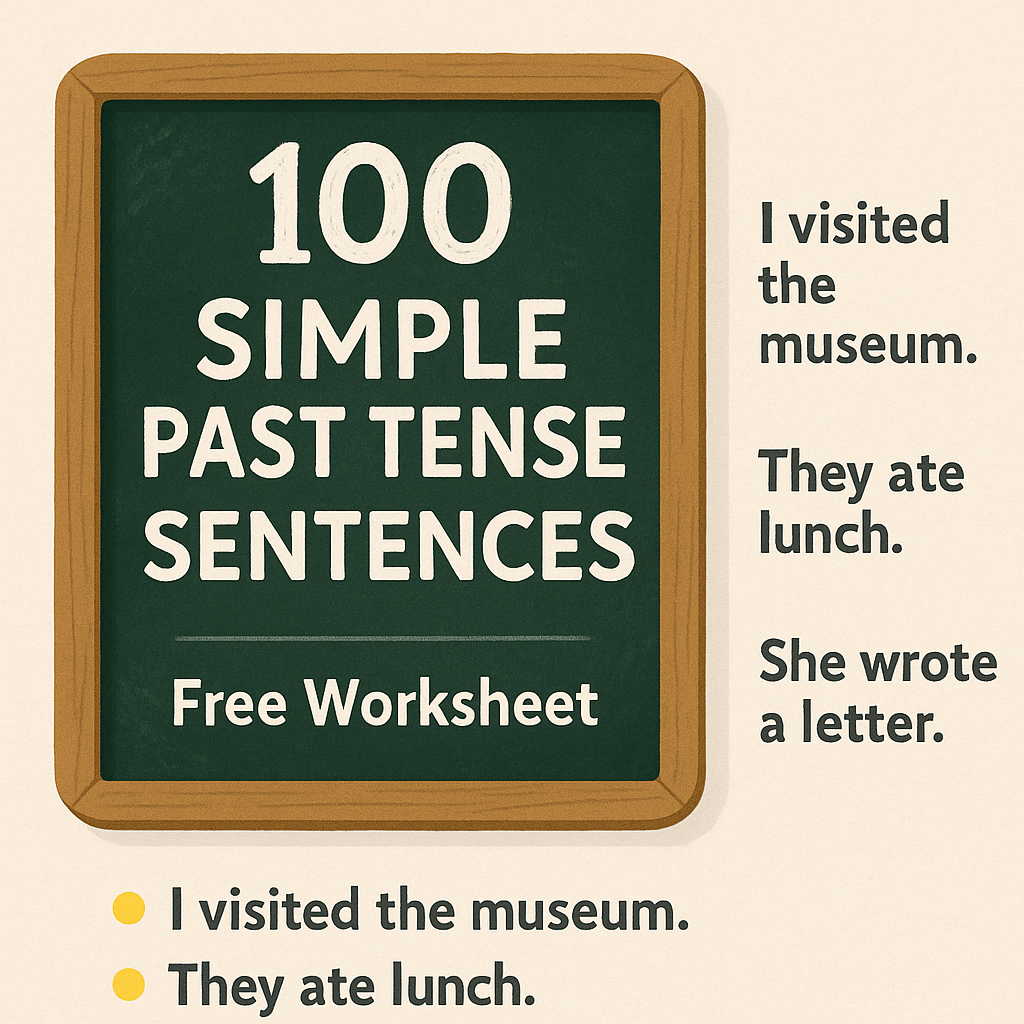The simple past tense is often called the “storytelling tense” — and for good reason! It’s the backbone of narratives, whether you are sharing what you did over the weekend, describing a childhood memory, or recounting a historical event. If you are learning English, understanding how to use simple past tense sentences gives you more range for written and spoken conversations! It makes you sound and feel more confident in your English skills and understanding.
One-sentence rule: Use the simple past tense to talk about actions that started and finished in the past.
Imagine time like a timeline:
Yesterday ● Last Week ● Last Year
Each of these points marks when an action might have happened — all perfect uses of the simple past tense!
Rules of the Simple Past Tense
Regular Verbs
To form the simple past tense of regular verbs, just add -ed to the base form.
- If the verb ends in -e, just add -d.
- If the verb ends in a consonant + vowel + consonant, double the final consonant (e.g., stop → stopped).
- If the verb ends in -y after a consonant, change -y to -ied (e.g., carry → carried).
🟢 Example simple past tense sentence: She painted her room last night.
Irregular Verbs
Irregular verbs don’t follow -ed rules. Their past forms must be memorized.
🟢 Example: They ate all the cookies before dinner.
Negative Sentences
Use did not (didn’t) + the base verb (not the past form).
🟢 Example: He did not go to school yesterday.
Questions
Use Did + subject + base verb? to form past questions.
🟢 Example: Did you see the movie?
Time Adverbs
These words signal the past and are commonly used with this tense:
- yesterday
- last (night, week, year, etc.)
- ago (two days ago, a month ago)
- in + year (in 2020)
🟢 Example: We visited Rome last summer.
Common Mistakes to Avoid
❌ “I didn’t went to school.”
✅ “I didn’t go to school.”
🔍 Remember: after “didn’t,” always use the base verb.
❌ “He buyed a new phone.”
✅ “He bought a new phone.”
🔍 Irregular verbs have special past forms. “Buyed” is not one of them.
❌ “She was go to the store.”
✅ “She went to the store.”
🔍 Don’t mix tenses in the same sentence unless there’s a clear reason.
❌ “Did she visited her grandmother?”
✅ “Did she visit her grandmother?”
🔍 Use the base verb after “Did” in questions.
❌ “We seen a movie last night.”
✅ “We saw a movie last night.”
🔍 Use the correct irregular past form — “saw,” not “seen.”
100 Sentences of Simple Past Tense
You can save these images, you can print them, or hang them on your wall to practice them regularly.


🔹 Affirmative Sentences (25)
Affirmative Sentences (25)
I played with my toy train yesterday.
We painted beautiful pictures in art class.
They visited the zoo on Saturday.
The teacher read us a story.
We rode our bikes to the park.
The sun shone brightly in the sky.
Jack played soccer in the backyard.
Lisa planted flowers last spring.
She danced at the party last night.
He ate a delicious sandwich for lunch.
We explored ancient ruins during vacation.
Our class visited the Grand Canyon.
Emily skated on the frozen lake.
Dad swung the golf club and hit the ball.
Sarah caught the baseball.
Tom climbed a tree in the park.
My mom baked cookies for us.
The dog wagged its tail happily.
I jumped rope with my friends at recess.
Emma passed the volleyball.
We went bowling last weekend.
Mom brought home cake from the bakery.
The old cat died peacefully.
We crossed the bridge at sunset.
I forgot my homework at home.
I played with my toy train yesterday.
We painted beautiful pictures in art class.
They visited the zoo on Saturday.
The teacher read us a story.
We rode our bikes to the park.
The sun shone brightly in the sky.
Jack played soccer in the backyard.
Lisa planted flowers last spring.
She danced at the party last night.
He ate a delicious sandwich for lunch.
We explored ancient ruins during vacation.
Our class visited the Grand Canyon.
Emily skated on the frozen lake.
Dad swung the golf club and hit the ball.
Sarah caught the baseball.
Tom climbed a tree in the park.
My mom baked cookies for us.
The dog wagged its tail happily.
I jumped rope with my friends at recess.
Emma passed the volleyball.
We went bowling last weekend.
Mom brought home cake from the bakery.
The old cat died peacefully.
We crossed the bridge at sunset.
I forgot my homework at home.
🔸 Negative Sentences (25)
I didn’t go to the beach yesterday.
She didn’t finish her homework.
He didn’t eat breakfast this morning.
We didn’t see the movie.
They didn’t win the game.
I didn’t bring my umbrella.
The baby didn’t cry last night.
My friends didn’t visit me last weekend.
We didn’t hear the announcement.
She didn’t call me back.
They didn’t attend the meeting.
I didn’t understand the question.
He didn’t clean his room.
We didn’t take a photo.
She didn’t arrive on time.
I didn’t bake a cake.
Tom didn’t finish the race.
They didn’t enjoy the movie.
We didn’t travel last year.
I didn’t write the report.
Mom didn’t make dinner.
The kids didn’t do their chores.
I didn’t hear the alarm.
He didn’t open the gift.
We didn’t find the answer.
🔹 Yes/No & Wh- Questions (25)
Did you walk to school?
What did she eat for breakfast?
Did they enjoy the trip?
Where did you find the book?
When did he arrive?
Did your team win the match?
Why did they leave early?
Did she call her mom?
Who did you meet at the party?
Did it rain last night?
What did he buy at the store?
Did you watch the show?
When did we last speak?
Where did they stay?
Did your brother break the window?
Who did she talk to?
Did the kids eat lunch yet?
What did you see at the museum?
Did he forget his keys?
When did you travel to Japan?
Did she sing at the concert?
What did the teacher say?
Did they finish the puzzle?
Where did you go yesterday?
Did you like the gift?
🔸 Irregular Verb Spotlight (30)
He went to the store.
They saw a shooting star.
She took her medicine.
I wrote a letter.
We drove across the country.
Tom spoke to the principal.
They built a treehouse.
I chose the red one.
Sarah ate all the cookies.
The dog bit the toy.
He bought a new backpack.
I drank a glass of milk.
She slept through the alarm.
We flew to London.
He broke his glasses.
I felt tired after the trip.
They won the competition.
She stood in line for hours.
He lost his phone.
I left my wallet at home.
We found the missing key.
She sang beautifully on stage.
I ran to catch the bus.
He kept the secret.
The bird hid in the tree.
They understood the problem.
I swam in the lake.
She read the whole book.
He threw the ball far.
We stood under the umbrella.
Generate Your Own Simple-Past Sentences
Type any verb—for example, drive, laugh, or study—and click Generate. The tool will instantly create five brand-new simple-past sentences, with the verb highlighted in bold. Copy the examples into your notes, use them as extra practice, or challenge a classmate to make them negative or interrogative forms.
Conclusion
The simple past tense serves as a cornerstone of English grammar, providing a clear and concise way to express past actions, events, and experiences. Through our exploration of its significance and rules, we’ve delved into the essence of this essential grammatical construct, highlighting its versatility and applicability across various contexts.
From forming narratives and recounting personal anecdotes to analyzing historical events and conducting academic research, the simple past tense empowers speakers and writers to communicate effectively and eloquently about the past. By mastering its usage and adhering to its rules, individuals can enhance their linguistic proficiency and convey their thoughts and ideas with clarity and precision.
As we’ve seen through the compilation of 100 sentences in simple past tense, the beauty and richness of the English language are manifested in its ability to capture the essence of past moments and experiences. Whether it’s describing a childhood adventure, narrating a historical event, or sharing a memorable encounter, the simple past tense provides us with a linguistic tool to articulate our stories and memories with authenticity and depth.
We hope this blog post has been a valuable resource in your journey to understand and appreciate the simple past tense. By incorporating these learnings into your writing and communication, you’ll be better equipped to express yourself effectively and engage with others in meaningful dialogue. So, continue exploring the wonders of language, and let the simple past tense be your guide in unlocking new realms of expression and creativity.
Thank you for joining us on this linguistic journey, and we look forward to sharing more insights and discoveries with you in the future. Keep learning, keep growing, and keep embracing the beauty of language!
Simple Past Tense Worksheet – Gap-Fill, Multiple Choice & Verb Table
Reinforce today’s lesson with this three-part worksheet. Students first rewrite ten sentences in the simple past, choose the correct past form in a multiple-choice quiz, and then complete a 10-verb irregular table. An answer key follows so learners—or busy teachers—can check work instantly.
Simple Past Tense – 45-Minute Lesson Plan (Rules, Practice & Exit Ticket)
Need a grab-and-go lesson for tomorrow’s class? This 45-minute plan reviews the simple-past structure, guides students through pair work with regular & irregular verbs, and wraps up with a quick exit-ticket reflection. All materials—timeline graphic, worksheet Parts A-C, and a 40-verb cheat-sheet—are linked below so you can start teaching in minutes.

